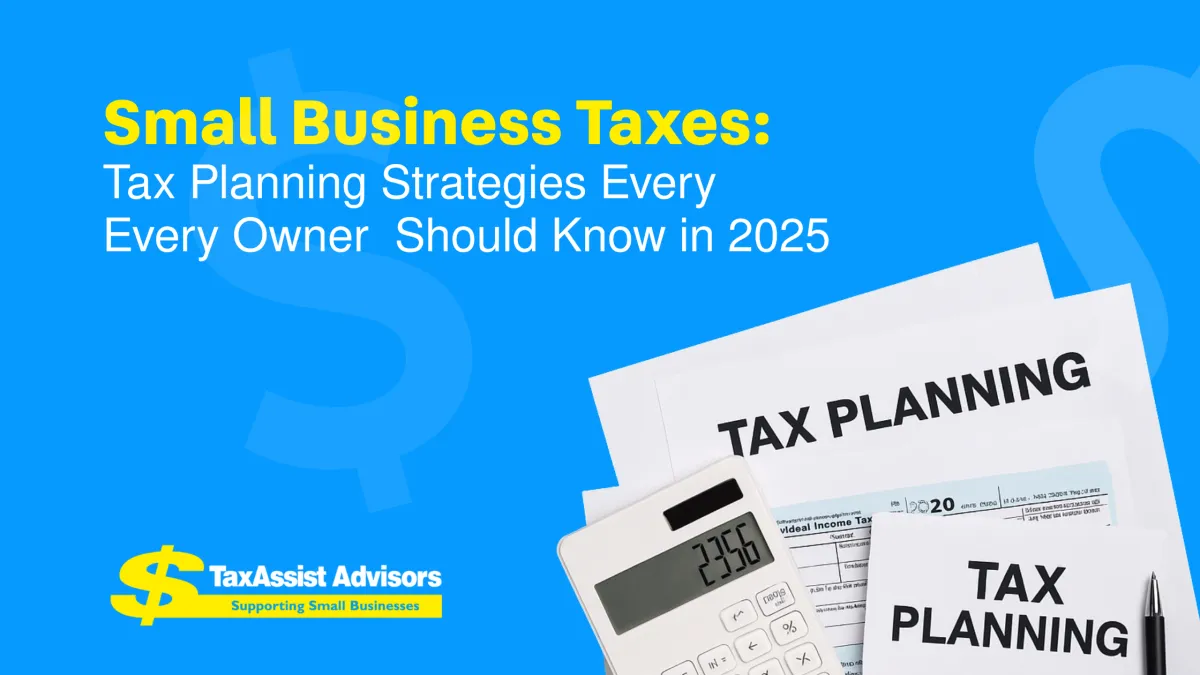
TaxAssist Advisors
Reach your tax, financial, & business goals faster

Small Business Taxes: Tax Planning Strategies Every Owner Should Know in 2025
Introduction – Why Planning, Not Just Filing, Is Key in 2025
Tax filing is reactive. Tax planning is proactive—and it can be the difference between scrambling to cover a big bill or leveraging your business income to build wealth. In 2025, small businesses face a complex tax environment filled with changing deductions, credits, and compliance traps. That’s where strategic planning comes in. At TaxAssist Advisors, we focus on proactive tax strategies that align your tax obligations with your long-term business goals.
Understanding the Core Taxes Small Businesses Must Plan Around
Federal Income Tax
Your entity type determines how you're taxed—whether income passes through to your personal return (sole proprietorship, partnership, S corp) or gets taxed at the corporate level (C corp).
Self-Employment Tax
If you’re a sole proprietor or partner, you pay both the employer and employee share of Medicare and Social Security. Planning around this—like electing S corp status—can save thousands.
Employment Taxes
Beyond employee salaries, you owe FICA taxes and unemployment contributions. Strategic planning helps you avoid payroll surprises and use wages efficiently (e.g., for R&D credits).
State & Local Taxes
Nexus laws are tightening. If you sell across state lines or operate remotely, you may owe taxes in multiple states. Planning ensures you don’t overpay or face penalties.
Estimated Quarterly Taxes
Quarterly taxes are due in April, June, September, and January. Forecasting and planning cash flow around these dates can avoid underpayment penalties.
Choosing the Right Business Structure for Tax Efficiency
Entity choice isn’t just about legal protection—it’s a tax decision. A sole proprietor might benefit from electing S corp status to reduce self-employment tax. Growing businesses might need a multi-entity setup to separate liabilities or manage income shifting.
Proactive Tax Planning Moves for 2025
Maximize Retirement Contributions
Set up a Solo 401(k) or SEP IRA to reduce taxable income. High earners can use defined benefit plans for larger deductions.
Income Shifting Strategies
Hire your spouse or teen children (at fair market wages). Structure management companies or leasebacks when legally appropriate to distribute income.
Accelerate or Defer Income
If income is high this year but you expect lower income next year (or vice versa), you can time invoicing or purchases accordingly.
Use the Right Deductions at the Right Time
Take advantage of 100% bonus depreciation before it phases out. Section 179 lets you deduct equipment purchases up front.
Health Benefits Planning
Set up an HSA, QSEHRA, or ICHRA to reimburse or deduct healthcare costs. These are tax-deductible and valued by employees.
Tax Credits: Don’t Leave Free Money Behind
R&D Tax Credit: Available to startups and service-based businesses using technical innovation.
Energy Credits: Install solar panels or energy-efficient HVAC? You might qualify.
Work Opportunity Tax Credit: Hiring veterans or disadvantaged employees may net you thousands in credits.
Advisory Tip: Plan for IRS Red Flags
Deductions are great—but they must be defensible. Don’t overstate home office expenses or misclassify workers. At TaxAssist Advisors, we guide clients to claim everything they're entitled to without triggering audits.
The Role of Ongoing Tax Advisory in Business Growth
Tax strategy isn’t a once-a-year conversation. We help clients review their financials quarterly, explore restructuring, and model how tax decisions impact investments. From funding equipment to preparing for exit, taxes touch every business decision.
Frequently Asked Questions (FAQs)
What’s the difference between tax preparation and tax planning?
Preparation reports what already happened. Planning shapes what happens next.
How can small businesses lower their tax bill legally?
Entity optimization, smart deductions, strategic income deferral, and using all available credits.
Is S Corp status still worth it in 2025?
Yes, especially if you're netting over $50K/year in profit. It can reduce self-employment taxes when managed properly.
What if I operate in multiple states?
Planning is critical to avoid double-taxation. Nexus laws vary, and proactive compliance saves penalties.
When should I start planning for taxes—January or now?
Now. The best tax strategies work over the course of the year, not the week before filing.
How often should I meet with a tax advisor?
Quarterly is ideal. It allows for cash flow planning, adjustment for law changes, and strategic execution.
Final Thoughts – Your Tax Plan Is Your Business Plan
Taxes aren't just an expense—they're a lever you can use to protect cash flow, fund expansion, and build wealth. Strategic tax planning is what separates businesses that survive from those that thrive.
End Note
At TaxAssist Advisors, we don’t just file taxes—we design strategies that work for your business. Whether you need entity structuring, multi-state tax optimization, or year-round planning, our team is here to help you stay ahead.
Visit our About Us page to learn how we help businesses nationwide. Ready to turn tax stress into strategic savings? Book a consultation today with TaxAssist Advisors.
Testimonial
Our Clients Reviews
Office:
2911 Chapel Hill Road #225
Douglasville GA 30135
Call
(770) 459-1052

Copyright © 2023 TaxAssist Advisors
A TaxAssist Advisors business owned and operated under licence by Bottom Line Tax Advisors, LLC
